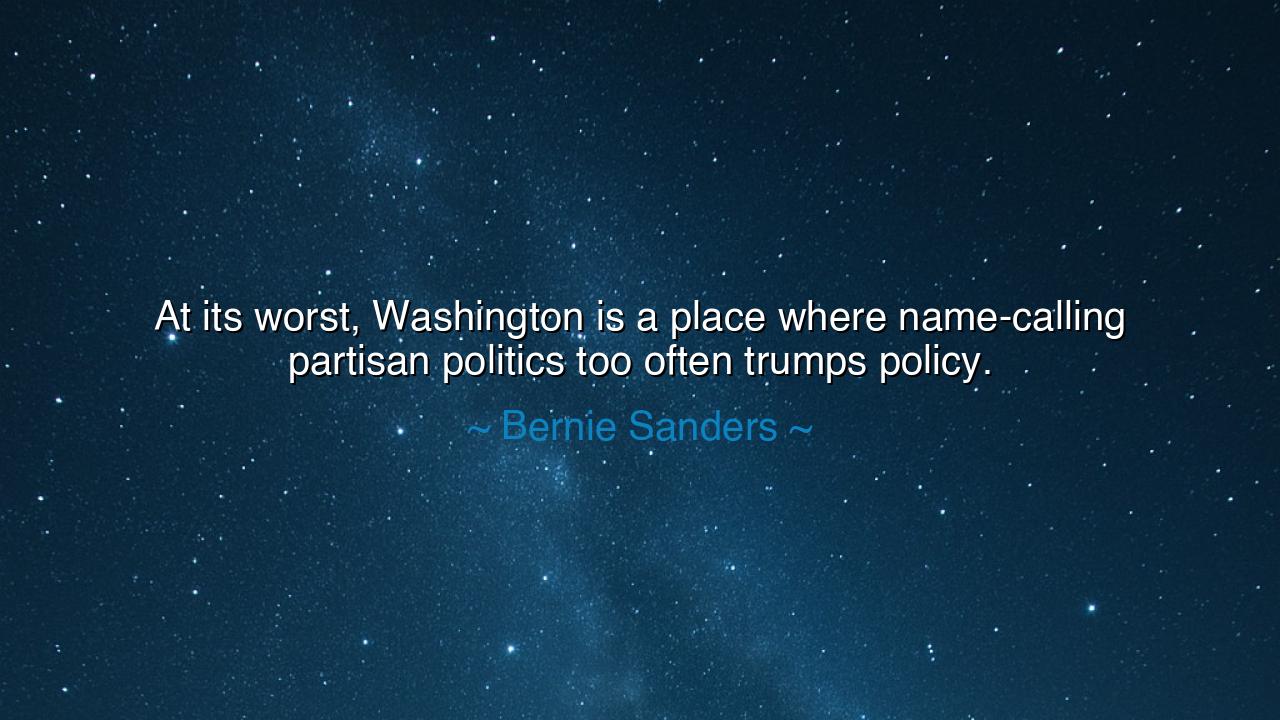
At its worst, Washington is a place where name-calling partisan
At its worst, Washington is a place where name-calling partisan politics too often trumps policy.






Hear, O seekers of truth, the words of Bernie Sanders, who has long stood as a critic of power’s corruption: “At its worst, Washington is a place where name-calling partisan politics too often trumps policy.” In this utterance, he laments the decline of noble governance into petty rivalry, where the battle of words overshadows the duty of action. For when politics becomes only insult and division, the people’s needs are forgotten, and the state becomes a theater of vanity.
For policy is the lifeblood of democracy—the careful crafting of laws that feed the hungry, protect the weak, and guide a nation toward justice. Yet when partisan politics takes precedence, policy withers. Leaders, instead of serving, seek only to score victories over their rivals. Sanders speaks to this sickness: that Washington, meant to be the house of the people, too often descends into bickering while urgent crises remain unresolved.
History gives us mirrors. In ancient Rome, the Senate of the late Republic ceased to govern with vision. Senators hurled insults, formed factions, and sought power for themselves. Policy was abandoned for rivalry, until the republic collapsed into dictatorship under Caesar. So too, Sanders warns, can any democracy fall when name-calling replaces wisdom, and partisan war trumps the common good.
Yet his words are also a call to vigilance. If partisan politics devours policy, then it is the duty of the people to demand better—to hold leaders accountable not for their insults, but for their deeds. A government that serves must rise above faction, and a statesman’s worth is measured not by how he mocks his opponent, but by how he uplifts his people.
Therefore, let this wisdom endure: politics without policy is emptiness, and governance without civility is ruin. The people must see through the fog of insult and seek the light of justice. Sanders’s words remind us that true leadership is not the art of wounding one’s rival, but the labor of healing a nation. Only when policy is restored to its rightful place above partisanship will democracy flourish.






NHnguyen ngoc ha
Sanders makes a valid point about how partisan politics can detract from meaningful policymaking. In an era of constant media coverage and political divisions, is it possible to maintain a productive dialogue? How do we ensure that political disagreements don’t overshadow the need for sound, practical solutions that actually benefit society?
LLKhanh Ly Le
Bernie Sanders’ frustration with the current state of Washington is evident, and it’s something that resonates with many people who are tired of political games. Do you think it’s possible for politicians to move beyond partisan labels and work together for the common good? What concrete steps could be taken to make sure policy is prioritized over party lines?
MDLe Thi My Duyen
It’s disheartening to hear that name-calling and partisan politics are so prevalent in Washington. When the focus is more on winning arguments than on solving problems, it can feel like the public’s needs get lost in the noise. What do you think is the root cause of this dysfunction, and how can we restore a more policy-driven approach to governance without getting bogged down by partisanship?
NNngoc nam
Bernie Sanders’ quote speaks to the frustration many feel about the state of politics, especially in Washington. It’s alarming how often partisan bickering seems to overshadow real policy debates. Do you think the increasing polarization in politics is making it harder for elected officials to focus on the issues that matter most to everyday people? How do we shift the focus back to practical, actionable policies instead of just political posturing?